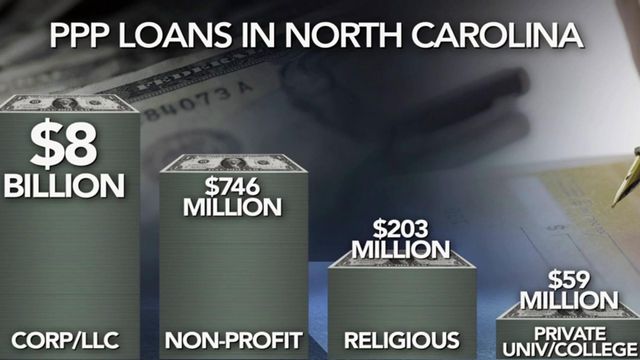Billions in federal loans saved many NC companies in pandemic, but not all
From the kitchen to athletics fields to larger corporations, North Carolina businesses faced pandemic-related shutdowns in March. But Congress provided businesses with a lifeline through the Paycheck Protection Program.
The PPP, which was part of the massive CARES Act relief package, offered small businesses the chance to get loans that wouldn’t have to be paid back if businesses met certain benchmarks, including keeping employees on the payroll.
More than 127,000 North Carolina businesses obtained more than $12 billion in PPP loans.
"It paid our rent. It paid our power bills. It paid the staff we had until we could kind of get our feet back under us," said Robert Royster, owner of Ruckus Pizza in Raleigh, which got a PPP loan.
"The intent from the beginning was to protect all of our employees," said Gary Buete, chief executive of North Carolina Football Club Youth.
The timing of the shutdown canceled most of the club’s spring season, as well as lucrative tournaments it hosts. Buete said the PPP loan offered a lifeline to his staff, which is mostly coaches.
"I think we were able to take advantage of that opportunity that was given to small businesses and allowed us to keep our employees whole during these times," he said.
WRAL Investigates searched the PPP data for North Carolina. Corporations and LLCs accounted for $8 billion of the loans. Nonprofits across the state, such as the SPCA of Wake County, received $746 million. Churches and other religious entities received $203 million in loans, while more than three dozen private universities and colleges collected more than $59 million, including Raleigh’s St. Augustine’s University and Shaw University, which combined to receive more than $5 million.
But the loans weren’t able to save every business. The Urban Turban restaurant in Cary, for example, received $38,000 in May and is now listed as permanently closed. Swahili Grill in Raleigh received $7,000 on May 7 and later shut down.
The PPP also produced success stories. The Kanki restaurant at Crabtree Valley Mall informed the state in March that it was permanently laying off employees, but an April PPP loan kept the popular restaurant open.
Royster said his pizzeria likewise survived because of the PPP loan, and he plans to file for another loan in the new relief package signed into law over the weekend.
"It saved all of our jobs. It saved our company. Without that, there is no Ruckus Pizza," he said.
Buete said NCFC Youth's loan helped the program keep kicking and transform.
"The PPP loan only goes so far. Then you have to change your business practices to some degree," he said.
Some of the state's PPP loans clearly raised questions, with federal fraud charges already filed against the owner of a Charlotte restaurant.











